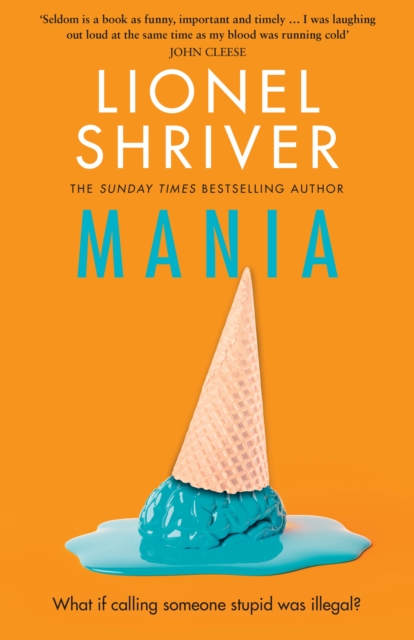About the Book

What if calling someone stupid was illegal?
In a reality not too distant from our own, where the so-called Mental Parity Movement has taken hold, the worst thing you can call someone is ‘stupid’. Everyone is equally clever, and discrimination based on intelligence is ‘the last great civil rights fight’.
Exams and grades are all discarded, and smart phones are rebranded. Children are expelled for saying the S-word and encouraged to report parents for using it. You don’t need a qualification to be a doctor.
Best friends since adolescence, Pearson and Emory find themselves on opposing sides of this new culture war. Radio personality Emory – who has built her career riding the tide of popular thought – makes increasingly hard-line statements while, for her part, Pearson believes the whole thing is ludicrous.
As their friendship fractures, Pearson’s determination to cling onto the ‘old, bigoted way of thinking’ begins to endanger her job, her safety and even her family.
Format: Hardcover (288 pages) Publisher: The Borough Press
Publication date: 11th April 2024 Genre: Alternate History, Satire
Find Mania on Goodreads
Purchase Mania from Bookshop.org [Disclosure: If you buy books linked to our site, we may earn a commission from Bookshop.org, whose fees support independent bookshops]
My Review
My initial thought as I read Mania was, ‘Go on Lionel, get it all off your chest’. In the author’s envisioned world, the Mental Parity Movement means discrimination on the basis of intelligence is forbidden. No more tests or entry qualifications, no more calling someone dumb (the ‘D-word’) or, equally, calling them smart (the ‘S-word’), no more suggesting you’re better at doing something than someone else, even if you are. Using long words is frowned upon so in this alternate history Barack Obama doesn’t get a second term as US President because he’s too eloquent; Joe Biden is elected instead. The fact you don’t have to know anything about a subject to be appointed to a position, even in the higher reaches of government, has geopolitical consequences too.
From the beginning we’re made aware that Pearson is a person with defiance in her DNA. It started in childhood growing up as a Jehovah’s Witness. (I guess the author chose this as an example of a religion requiring strict adherence to its doctrines rather than any particular hostility towards it.) Pearson rebels against its constraints and is taken in by the family of her friend, Emory.
Pearson finds the Mental Parity Movement ridiculous and is vocal in her disdain for it. She believes Emory holds similar views and is dismayed when she discovers that’s not the case. The irony is that Pearson might be considered an example of everything the Mental Parity Movement set out to dismantle. Her first two children were conceived by artificial insemination by a donor she deliberately selected for their high IQ and she is gratified that Darwin and Zanzibar turn out to be exceptionally bright. She’s equally dismayed that her daughter Lucy, by her husband Wade, is not and Pearson sets about trying to correct this with the same relentless zeal her mother imposed on her.
Wade’s an easy-going man generally whose skills are practical in nature. But even his patience is tested by Pearson’s rebellious attitude. ‘What would you sacrifice by giving in? Just – accept. Everyone’s equally smart. Then move on. Get on with your life.’ Ignoring his advice, and in a moment of madness, she deliberately provokes the university where she works as a lecturer by choosing as a set text for her class a novel with a provocative title. It has serious consequences for herself and her family. The author also shows us the danger of overcorrection.
The book is genuinely laugh out loud funny in places. One of my favourite episodes is when Pearson is required to attend a Cerebral Acceptance and Semantic Sensitivity course. The author has a lot of fun here. Words such as ‘dumbstruck’ or ‘dumbbells’ can no longer be used. Fog cannot be described as ‘dense’, a piece of wood cannot be ‘thick’ and rooms with poor lighting can no longer be ‘dim’ and definitely cannot be fitted with a ‘dimmer switch’. Dangerous vocabulary extends into the kitchen; mention of the herb sage is definitely a no-no.
When I read an extract from the book, I wasn’t sure if its satirical premise could sustain a full novel. I think it just about does and I enjoyed it more than I expected. My first experience of Shriver’s writing, Mania is a witty, satirical and at times surreal take on cancel culture and the temptation to conform to the prevailing orthodoxy.
I received a proof copy courtesy of The Borough Press via Readers First.
In three words: Satirical, funny, thought-provoking
About the Author

Lionel Shriver’s fiction includes Should We Stay or Should We Go; The Motion of the Body Through Space; The Mandibles: A Family 2029-2047; Property; the National Book Award finalist So Much For That; and the New York Times bestsellers The Post-Birthday World and We Need to Talk About Kevin, winner of the Orange Prize and an international bestseller adapted for a 2011 film starring Tilda Swinton.
Her journalism has appeared in The Guardian, The Times, The Daily Telegraph, the New York Times, the Wall Street Journal, Harper’s Magazine, UnHerd, National Review, City Journal and many other publications. She’s a regular columnist for The Spectator.
She lives in London and Brooklyn, New York.

